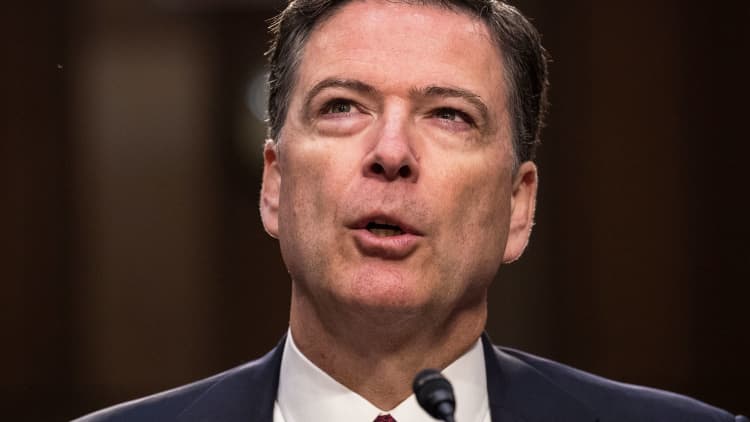
James Comey's testimony was not "even close" to proving that President Donald Trump had tried to obstruct justice in the probe of alleged Russia meddling in the election, a former Bush administration Justice Department official said Friday.
John Malcolm, a deputy assistant attorney general during the George W. Bush presidency, said there could be an argument that Trump's actions, as described by Comey, were an "implied threat."
"There was something in this for everybody," Malcolm told CNBC's "Squawk Box," referring to the fired FBI director's testimony Thursday before the Senate Intelligence Committee.
Malcolm said the positive takeaways for Trump included confirmation the president was not under investigation and that Comey outed himself as the one who leaked to the media his notes about meetings with the president in hopes of getting a special counsel appointed.
Robert Mueller was subsequently appointed
Trump, in his first tweet since the Comey testimony, said Friday morning: "Despite so many false statements and lies, total and complete vindication." He also said, "Wow, Comey is a
Malcolm also said Obama Attorney General Loretta Lynch was "dinged up" by Comey. The former FBI director testified that he was confused by Lynch's instructions in 2015 to call the Hillary Clinton email inquiry a
On the other hand, Malcolm said Trump critics could take solace in Comey's assertion that Comey felt pressured by the president to drop an investigation into now-fired national security advisor Michael Flynn's contacts with the Russians.
Comey did not drop the Flynn investigation and was later fired as FBI director by Trump.
As a former prosecutor, Malcolm said he would not take legal action against Trump based on what he heard from Comey's Senate testimony. "I certainly wouldn't indict immediately. I don't think there would be a provable case for obstruction of justice at this point," he added. "They're not there yet, not even close."
Under current DOJ guidance, the special counsel can't bring a charge against the sitting president. Any recourse against Trump would have to be addressed on Capitol Hill, with the House and Senate as judge and jury.


